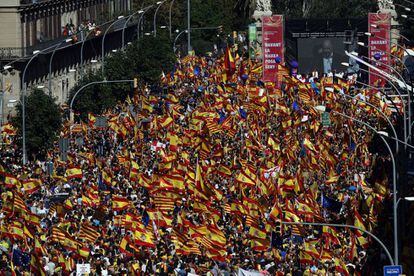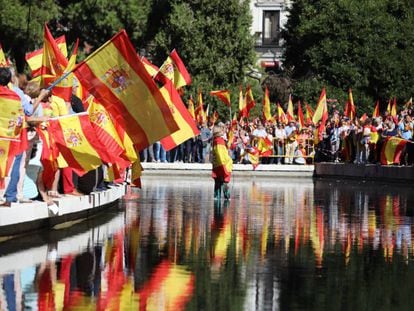Catalonia: The end of hegemony
The pro-unity march seen in Barcelona on Sunday has blown away the narrative of the pro-secessionists

The argument most insistently used by Catalan separatists was dealt an unmitigated defeat on Sunday. The march in Barcelona evidenced the fallacy of the notion that there is one single people united behind their cause, and that this gives them the legitimacy to force a unilateral secession from Spain. Catalan society is a lot more diverse than nationalists have been relentlessly claiming for the last few years.
Nobody can deny the separatists’ ability to mobilize their own sympathizers, and nobody can deny that there is a significant section of Catalans who demand a different relationship with Spain. But starting this Sunday, nobody will be able to deny that there is a vast amount of Catalans who reject the call to break away from Spain.
For decades, Catalan nationalism has built up an ideological monopoly and smothered society’s plurality
The secessionist forces had gone to lengths to get the streets to provide some legitimacy to the parliamentary masquerade they themselves orchestrated with the passing of their breakaway laws. And it was the streets that told them this Sunday that many people don’t want anything to do with a process that entails destroying the Statute and the Constitution.
What was really new about Sunday is that a majority of people who had been silent until now finally spoke out. And they did so in several voices: they carried the Catalan, Spanish and European flags. There were even contradictory voices within the march, a fact that became evident when former European Parliament president Josep Borrell asked marchers to stop a chant asking for prison for Catalan premier Carles Puigdemont. On this matter, the Socialist politician told the crowd, it is the courts who must hand down a judgment, not the streets.
The remark could also be construed as a wake-up call about the most elemental rules of democracy. In democratic regimes, it is never the street that decides on a country’s course – contrary to what some populist movements would like. Democracies guarantee social diversity and the balance of power. For this reason, ever since the breakaway process openly embraced populism and the Catalan government awarded itself an alleged mandate by a “united people” to achieve independence, its legitimacy came into question.
The Catalan government has been forced to hear from the streets what it refused to hear inside its own parliament
Now, people have come out onto the streets to defend constitutional democracy, and politicians have a duty to listen. But the streets can never impose anything, save in those cases when an uprising may be justified because no democracy exists in the first place.
The Catalan government has been forced to hear from the streets what it refused to hear inside its own parliament: that there is no one single Catalan people that desires independence, and that Catalonia is in fact a diverse place. Now, authorities will have to provide an answer. Some people who remain trapped in their bubble have already dismissed the Sunday march because the PP was part of it, and because there were Spanish flags. That would be one erroneous interpretation of what Sunday really meant. Because in a democracy, in Catalonia, there is room for everybody.
For decades, Catalan nationalism has built up an ideological monopoly and smothered society’s plurality. But on Sunday, this hegemony built on control over the streets, political institutions and civil society came crashing down. And separatism, which was already living outside the law, has now also lost its legitimacy.
English version by Susana Urra.












































